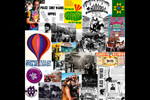Free City Bank
In the Digger Papers
essay
Post-Competitive, Comparative Game of Free City appears this
description of the Free Bank:
Free City Bank and Treasury
this group should be responsible for raising money, making free
money, paying rents, for gasoline, and any other necessary expenses
of the Free City Families. They should also organize and create
small rackets (cookie sales, etc.) for the poor kids of the ghettoes
and aid in the repair and maintenance of the machinery required in
the performance of the various services. [Digger Papers, p. 15]
Amidst the whirlwind of Digger activities that the Free City
Collective carried out in late 1967 and the winter/spring of 1968, the
role of Free Banker was played by Bill Fritsch. Also known as Sweet
William, and referred to as Tumble in Ringolevio, Lenore Kandel had
eulogized him in her poem Love Book which the SF police busted
for obscenity. Bill was probably the ideal free banker, with a distinct
air of intimidation riding his Harley motorcycle in leather jacket. But
he was also a "stone idealist" (a term Emmett used to describe the
original Diggers). Bill carried out the role of Free Banker with a
distinctive flair. This video clip from Nowsreal below shows him riding
his Harley down Haight Street throwing handfulls of coins in the air:
Free City Banker on Haight Street
When the iconic "1% Free" poster mysteriously appeared on outdoor
walls in public spaces in the winter of 1968, much speculation about the
meaning of the message ensued. Some merchants were said to think of it
as a shake-down by the Diggers. This impression was undoubtedly
reinforced by the full page announcement for the Free Bank that appeared
in the San Francisco Express Times (2/29/68):
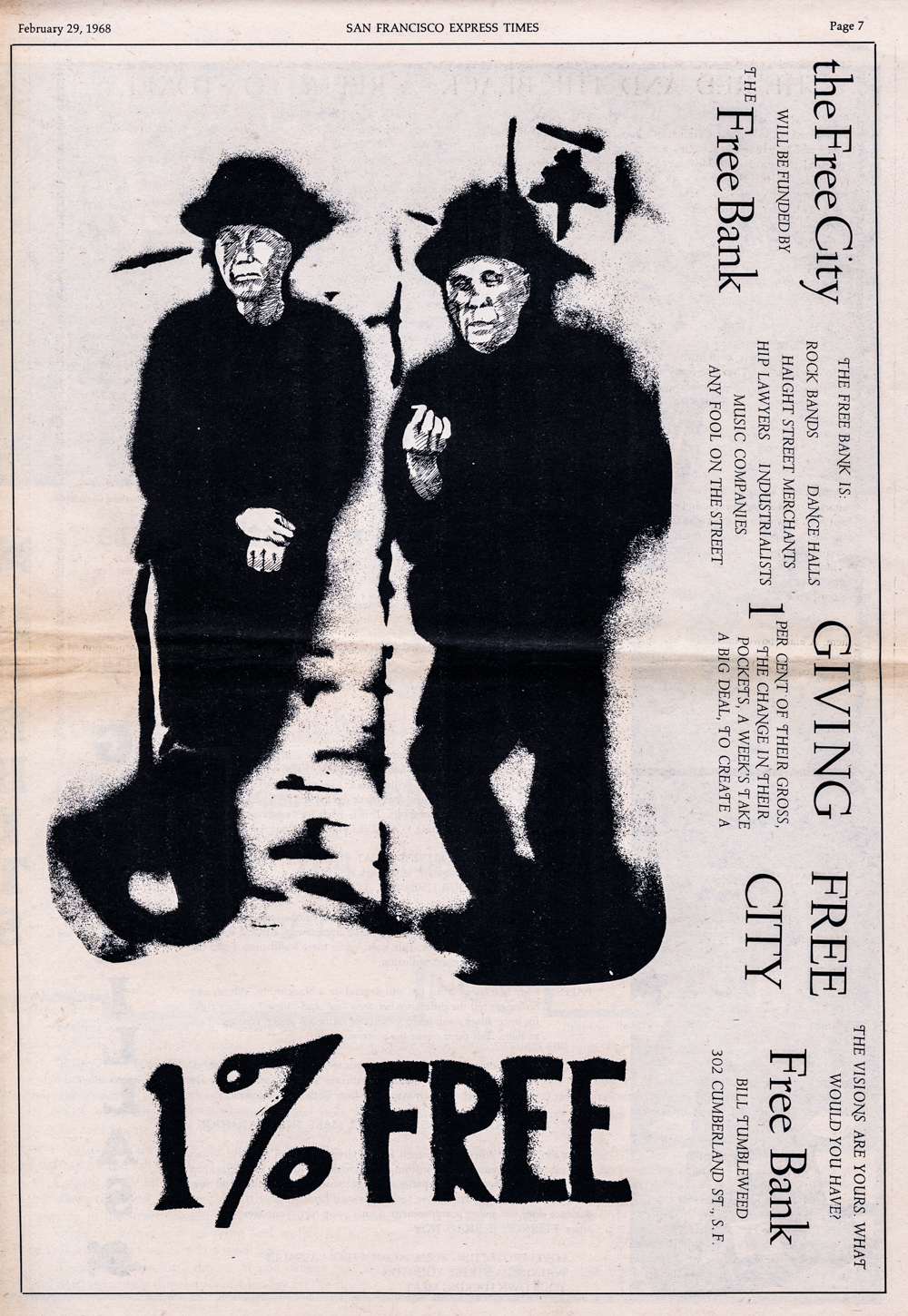
The Free City
will be funded by
The Free Bank
The Free Bank is:
Rock Bands Dance Halls
Haight Street Merchants
Hip Lawyers Industrialists
Music Companies
Any Fool On The Street
GIVING
1 per cent of their gross,
the change in their
pockets, a week's take
a big deal, to create a
FREE CITY
The visions are yours. What
would you have?
Free Bank
Bill Tumbleweed
302 Cumberland St, S.F.
Some of the merchants appreciated the Diggers and what they were
doing and came through with what they could afford. Peter Berg told me
that the owner of the bead shop on Haight Street walked into the Free
Store one day and said, "What do you guys need?" Peter replied, "I need the rent every month
for this Store." And she said, "You got it." Peter explained that "She
just wanted to do that. She thought it was interesting." Peter talked
about another merchant who came through when the Diggers were planning
events and needed to find the right props. He was the owner of the
Phoenix head shop:
We would just walk in and tell him what we needed, and he'd say,
"Sure, just take it." So if we were going to have an event in the
park, and we needed 3000 wooden flutes because somebody's idea of
Art, or Theater, was to have people play wooden flutes for 15
minutes in the scenario of what was going to happen that day—which
was the way we designed those events. I don't know if you are aware
of it—they weren't wide open. They were built to make wide-openness
happen. So one time, Lenore Kandel thought it would be the greatest
idea in the world to hang 500 sets of glass, Chinese chimes in every
bush around Marx Meadow—that if we did that, people would discover
them, take them home with them, play them and be entertained and
felt elegant for the event. So, we went in and asked Tosh for 500
sets of Chinese chimes. He said, "Sure. Just take them."
[Interview of Peter and Judy Berg by Marty Lee and Eric Noble, 1982]
Not all
merchants took so kindly to the 1% Free suggestion in the Free Bank
announcement. Some posted their own notices challenging the Diggers and
claiming near-poverty as their defense. In any case, it seems that the
major source of funding for the Free Bank was the famous Digger hustles.
In an interview of Bill Fritsch that I did in 1974, he told me
that he and Emmett Grogan and Peter Berg and Peter Coyote would go to
Los Angeles and come back with $3000 or $4000 for the Free Bank. The
Free Bank only gave money for free projects and never loaned money to
people. "You need money, what do you need it for? Is it free? Then you
can have money, but no loans." Bill told me that he still had the Free
Bank book in which was recorded all income and expenses.
In an interview at the Free Print Shop in 1973,
Freeman House talked about Bill Fritsch in his role as Free Banker:
[He] rode around on his motorcycle with a hundred dollar bill in
his headband going from commune to commune and had conferences with
them about their economic position, what they needed and what they
actually had. If they needed something he would take it out of his
headband and give it to them. And if they didn’t, go on. He was
probably the only man in the city who could handle that role in that
style, you know.
One time when he got bored, he rode up Haight Street on his
motorcycle, and he’d gotten something like eighty dollars worth of
nickels, dimes and pennies and at that time Haight Street was just
jammed with spare-changers. You’d walk up there and on one side of the
street would be, “Spare change? Spare change? Spare change?” And, on the
other side, you’d hear … “Grass, acid,
speed, dope, grass.” So Bill Fritsch one Sunday afternoon just rode up that street at
like ten miles an hour, throwing handfuls of nickels, dimes, and
pennies, just to amuse himself. Some incredible actors on that
stage. [Interview of Linn House, 1973]
The Free City Bank was the model on which the Kaliflower Commune
operated and which was later used for the Free Food Family intercommunal
network. All monies were pooled and a communal treasurer handled the
responsibility of banking. In the case of the Free Food Family, all food
stamps were pooled and one commune (Hunga Dunga) did all the food buying
for the rest of the communes. In the history of the Sixties
Counterculture, I don't think that sharing of money/resources will be
found to have been a cause for the eventual disillusionment that took
place. The Free Bank idea worked while it lasted.
July 2017
|
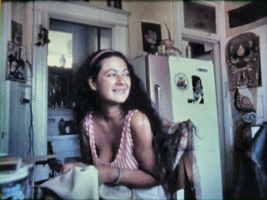
Lenore Kandel (in Nowsreal)
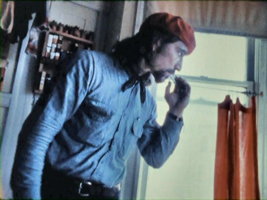
The Free Banker (in Nowsreal)
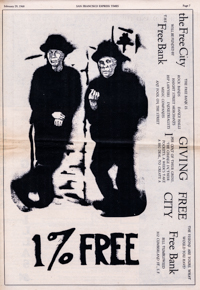
Full page spread in SF Express Times 2/68
|
